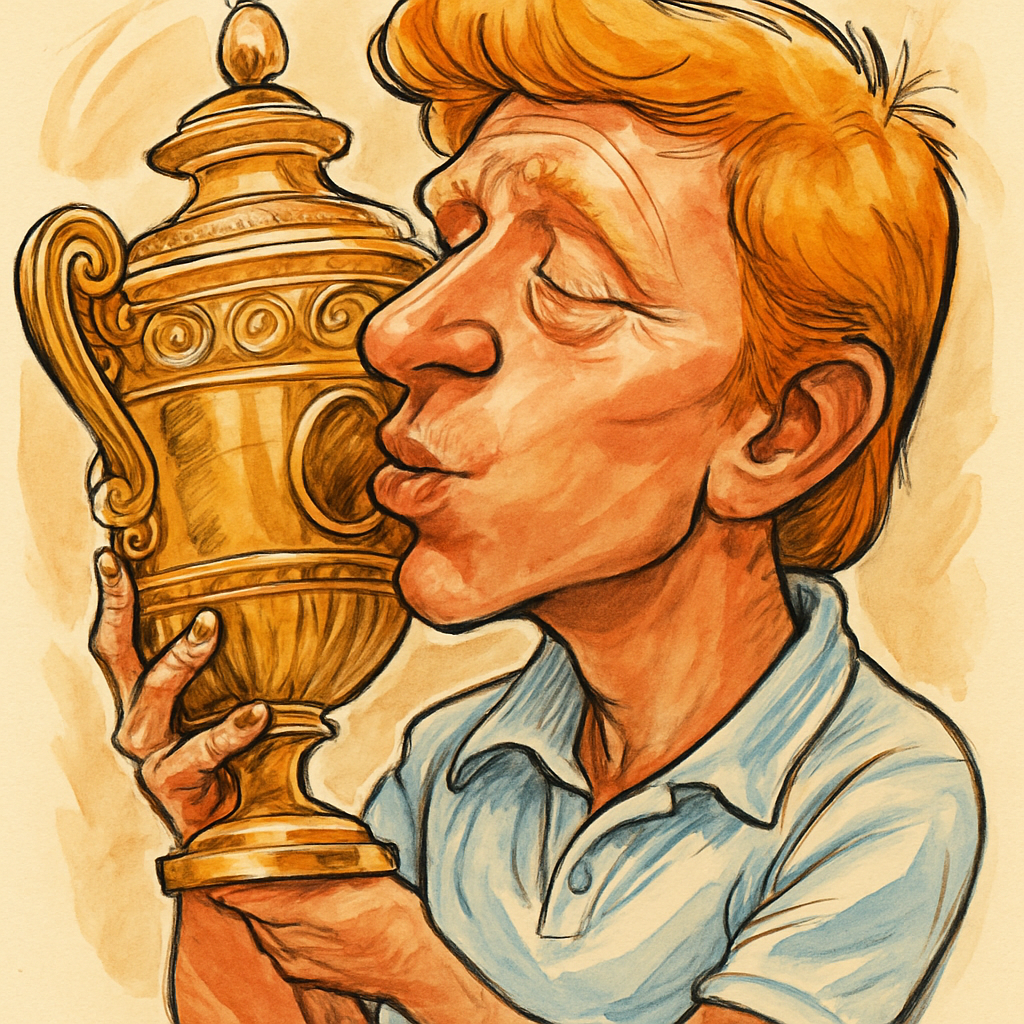LONDON — In a candid and revealing interview, tennis legend Boris Becker has expressed profound regret over his historic Wimbledon victory in 1985, a triumph that saw him become the youngest-ever men's singles champion at just 17 years old. The six-time Grand Slam champion claims the unprecedented early success placed an unbearable weight of expectation on his young shoulders, fundamentally altering the trajectory of his life and career.
Becker, now 56, reflected on the moment that catapulted him from a relatively unknown German teenager to a global sporting icon overnight. "If I could go back, I would have wished to win my first major at 21 or 22," Becker stated, explaining that the immediate fame and pressure were overwhelming for someone who had not yet developed the emotional or psychological tools to cope.
The Burden of Instant Superstardom
Becker's victory was a seismic event in the sporting world. Seeded only fifth, his powerful serve-and-volley game took the tennis establishment by storm. He defeated the likes of Kevin Curren in the final, but the real challenge began when he left the hallowed Centre Court grass. "Suddenly, I was not just a tennis player; I was a national hero, a celebrity, a product," Becker recalled. The pressure to maintain that level of success was immense and immediate.
The German star went on to have an illustrious career, winning Wimbledon twice more (1986, 1989), the Australian Open twice (1991, 1996), and the US Open once (1989). However, he admits that the shadow of that first victory loomed large over every subsequent match. Every loss was magnified, and every victory was expected. The natural development and learning curve most athletes experience in their late teens and early twenties were compressed into a single, blinding fortnight.
Becker outlined several key areas where the early success had a detrimental impact:
- Public Scrutiny: His every move, on and off the court, was analyzed by a global media frenzy.
- Lack of Privacy: He lost the anonymity of youth, making normal adolescent experiences impossible.
- Psychological Pressure: The fear of failure became a constant companion from a very young age.
- Commercial Demands: Sponsorship and endorsement deals poured in, adding another layer of obligation.
A Lost Youth and the "Curse" of Success
Becker's reflections touch on a broader issue in professional sports: the toll of early prodigy on mental health. He described his life after Wimbledon as a whirlwind from which he never truly stepped off. "There was no time to grow up, to make mistakes in private, to learn who Boris Becker really was," he lamented. The discipline and singular focus required to be a champion left little room for personal exploration or a life outside of tennis.
This sentiment is echoed by other child prodigies in tennis, such as Jennifer Capriati and Martina Hingis, who also faced immense pressure. Becker believes the modern game, with its greater focus on player well-being and extended careers, might be better equipped to handle young stars like Carlos Alcaraz, who won the US Open at 19 and Wimbledon at 20. "The tours now have more support systems, psychologists, and media training. In my day, you were thrown to the wolves. You won, and you were expected to deal with everything that came with it, alone."
The Contrast with Modern Champions
When asked about Alcaraz's recent successes, Becker acknowledged the Spaniard's mature handling of fame but pointed out a crucial difference. "Carlos is a phenomenal talent, but he had time on the ATP Tour to adjust. He was a known entity for a couple of years before winning a major. My story was an absolute shock to everyone, including myself. I went from being a complete unknown to the most famous tennis player on the planet in two weeks." This suddenness, Becker argues, is what made his experience uniquely challenging.
A Legacy of Pressure and Resilience
Despite the regrets, Becker's career is a testament to his immense talent and resilience. He remained a top-tier player for over a decade, known for his fiery competitiveness and thunderous serve. However, his post-playing life has been marked by significant well-publicized challenges, including a recent prison sentence for bankruptcy offences. Some psychologists and sports commentators have suggested a link between the trauma of early fame and later-life difficulties.
Becker himself does not shy away from this connection. He has spoken about the difficulty of transitioning out of the sport that defined him since adolescence. "When you peak so early, the rest of your life can feel like an anti-climax. You spend your adulthood chasing that same high, that same level of adulation and purpose." The identity forged at 17, he suggests, can be a difficult one to shed.
His advice to young athletes and their parents today is cautious. "Talent is a gift, but it must be managed. Winning is the goal, but the timing of that win is crucial. Protect the youth of your children. The trophies can wait; their childhood cannot." He emphasizes the importance of a balanced life, strong support networks, and preparing for life after the final point is played.
Conclusion: A Champion's Complicated Truth
Boris Becker's confession is more than just a sports story; it is a human one. It challenges the simplistic narrative that winning is the ultimate and only goal. His regret is not for the victory itself—the sheer athletic achievement remains one of sport's greatest fairy tales—but for the context in which it occurred. The story of Boris Becker serves as a powerful reminder of the person behind the champion, a young man who achieved a dream so grand that it cost him the ordinary experiences that shape a balanced life. His legacy is thus a dual one: the immortal "Boom Boom" Becker who captured the world's imagination, and the man who has spent a lifetime grappling with the consequences of that magical, burdensome summer.

